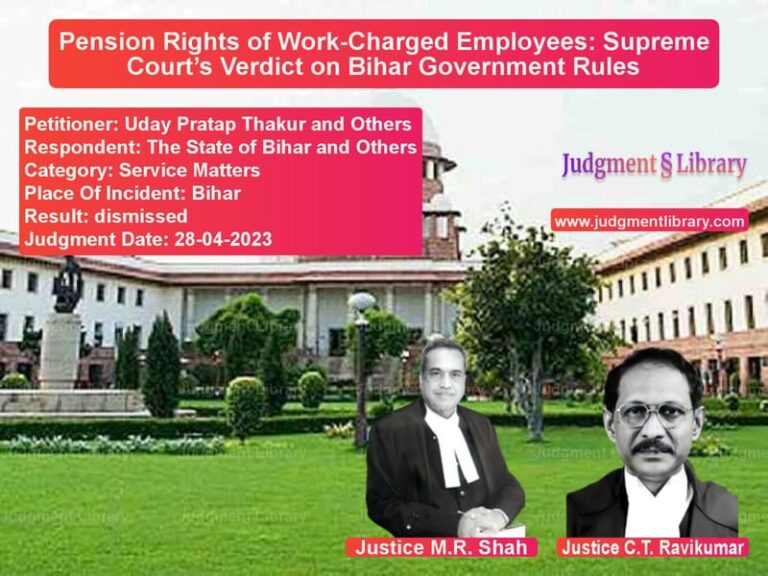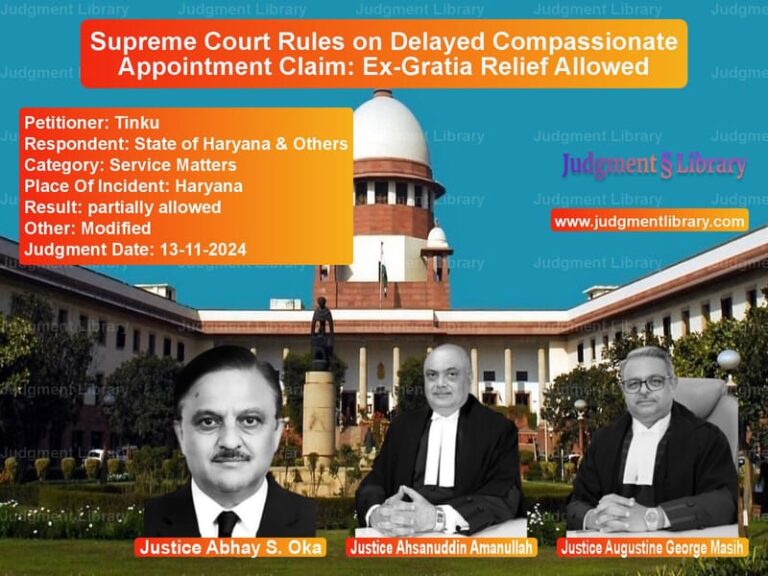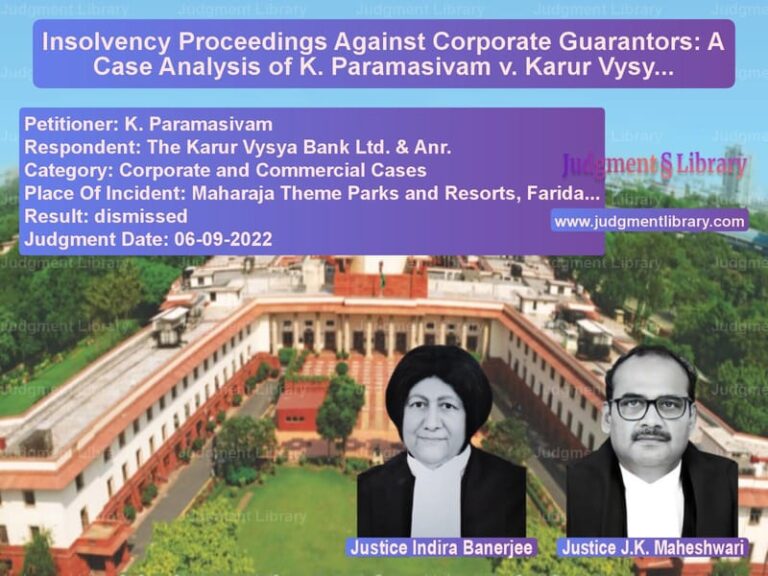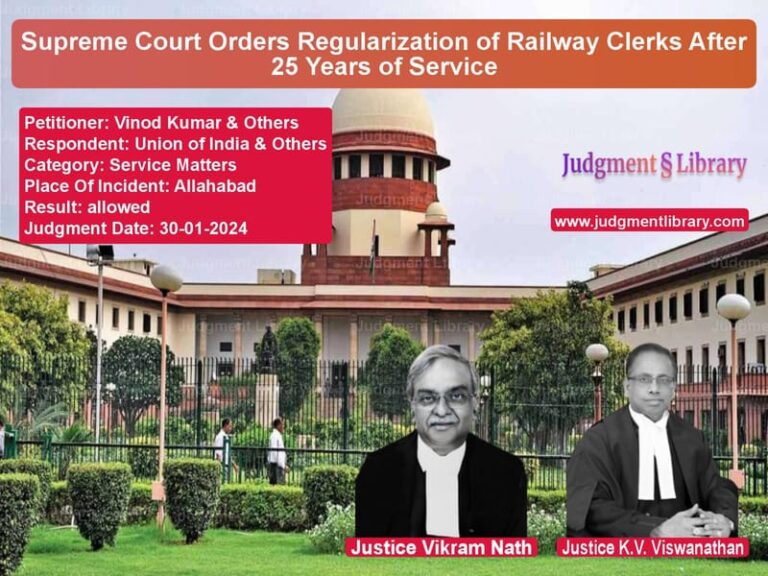Supreme Court Reduces Sentence in Attempt to Murder Case: Legal Interpretation of IPC Section 307
The case of Amit Rana @ Koka & Anr. v. State of Haryana revolves around the sentencing under Section 307 of the Indian Penal Code (IPC), which deals with attempt to murder. The Supreme Court, in its judgment dated July 22, 2024, upheld the conviction of the appellants but reduced their sentence from 14 years of rigorous imprisonment to 10 years, clarifying the legal limits of punishment under Section 307 IPC.
The judgment provides important insights into the sentencing provisions under criminal law and reiterates the principle that punishment must be proportionate to the offense.
Background of the Case
The appellants were convicted under Section 307 IPC read with Section 34 IPC and sentenced to 14 years of rigorous imprisonment along with a fine of ₹1,50,000 each. The conviction stemmed from a violent attack in which the victim suffered a severe spinal injury, leading to permanent paralysis.
Key Facts
- The incident occurred on June 9, 2016, when the appellants attacked the victim, causing grievous injuries.
- The victim was hospitalized from June 9, 2016, to July 2, 2016 and suffered permanent spinal damage.
- The appellants were convicted by the Trial Court and sentenced to 14 years of rigorous imprisonment.
- The High Court upheld the conviction and sentence.
- The Supreme Court admitted the appeal but limited it to the question of sentencing.
Arguments by the Appellants
The appellants contended:
- Section 307 IPC prescribes a maximum sentence of 10 years for attempt to murder unless the offense results in hurt, in which case life imprisonment may be awarded.
- The punishment of 14 years exceeded the statutory limit under Section 307 IPC.
- The phrase “or to such punishment as is hereinbefore mentioned” in Section 307 IPC does not allow courts to impose a sentence beyond 10 years unless life imprisonment is awarded.
Arguments by the Respondent (State)
The State of Haryana argued:
- The severity of the injuries warranted a sentence higher than 10 years.
- The victim was left paralyzed due to the attack, justifying a higher sentence.
- The punishment should be proportionate to the gravity of the offense.
Supreme Court’s Observations
The Supreme Court analyzed the provisions of Section 307 IPC and concluded:
1. Interpretation of Section 307 IPC
Section 307 IPC states:
“Whoever does any act with such intention or knowledge, and under such circumstances that, if he by that act caused death, he would be guilty of murder, shall be punished with imprisonment of either description for a term which may extend to ten years, and shall also be liable to fine; and if hurt is caused to any person by such act, the offender shall be liable either to [imprisonment for life], or to such punishment as is hereinbefore mentioned.”
The Court observed that:
- Attempt to murder without causing hurt carries a maximum punishment of 10 years.
- If the act causes hurt, the offender may be sentenced to life imprisonment or up to 10 years.
- There is no provision to impose a sentence between 10 years and life imprisonment.
2. Proportionality of Punishment
The Court emphasized that the punishment must be proportionate to the offense. The ruling stated:
“When in unambiguous terms the legislature prescribed the maximum corporeal sentence imposable for the conviction under Section 307 IPC, the court cannot exceed the prescribed limit unless awarding life imprisonment.”
3. Limitation on Sentence
The Court held that:
- The sentence of 14 years was legally impermissible since it exceeded the statutory maximum.
- If the trial court found the crime to be serious enough to warrant a sentence beyond 10 years, it should have imposed life imprisonment.
- Since the State did not appeal for an enhancement of the sentence to life imprisonment, the Court did not consider increasing the punishment.
Supreme Court’s Final Verdict
The Supreme Court ruled:
- The conviction under Section 307 IPC was upheld.
- The sentence of 14 years of rigorous imprisonment was reduced to 10 years.
- The fine of ₹1,50,000 imposed on each appellant remained unchanged.
- The appeal was allowed in part, modifying only the sentence.
Conclusion
The Supreme Court’s decision in Amit Rana @ Koka & Anr. v. State of Haryana sets an important precedent on sentencing under Section 307 IPC. The ruling ensures that courts adhere strictly to statutory limits while sentencing and reinforces the principle that punishment must be proportionate to the offense.
Petitioner Name: Amit Rana @ Koka & Anr..Respondent Name: State of Haryana.Judgment By: Justice C.T. Ravikumar, Justice Rajesh Bindal.Place Of Incident: Haryana.Judgment Date: 21-07-2024.
Don’t miss out on the full details! Download the complete judgment in PDF format below and gain valuable insights instantly!
Download Judgment: amit-rana-@-koka-&-a-vs-state-of-haryana-supreme-court-of-india-judgment-dated-21-07-2024.pdf
Directly Download Judgment: Directly download this Judgment
See all petitions in Attempt to Murder Cases
See all petitions in Bail and Anticipatory Bail
See all petitions in Legal Malpractice
See all petitions in Judgment by C.T. Ravikumar
See all petitions in Judgment by Rajesh Bindal
See all petitions in partially allowed
See all petitions in Modified
See all petitions in supreme court of India judgments July 2024
See all petitions in 2024 judgments
See all posts in Criminal Cases Category
See all allowed petitions in Criminal Cases Category
See all Dismissed petitions in Criminal Cases Category
See all partially allowed petitions in Criminal Cases Category







